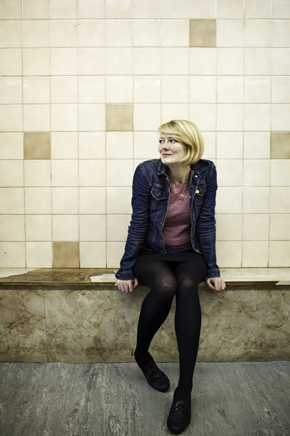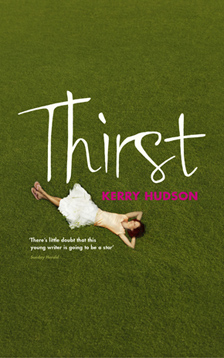Kerry Hudson: Love and need
by Alex Peake-TomkinsonKerry Hudson’s award-winning debut novel Tony Hogan Bought Me an Ice-cream Float Before He Stole My Ma drew partly on her experiences of growing up on estates and in B&Bs. Her second, Thirst, is about Alena, a woman sex-trafficked from Siberia, and Dave, a security guard who catches her shoplifting. When I meet Hudson for coffee in a museum café, I mention how upsetting I found sections of Thirst and she starts laughing before saying, “Oh no, I’m getting my first bad review, in the Wellcome Collection!” She goes on, “Tony Hogan had lots of dark content but it was mostly from a child’s perspective so I’d never really got to explore darker writing. And although everyone when they meet me thinks of me as a relatively cheery and upbeat person, I think part of the enjoyment of fiction is to be able to explore much, much darker themes. I mean, how far a person can be pushed and still come out whole and human and able to love? That was the crux of it for Alena, is she still able to love and trust and live after terrible things have happened to her? That’s why I had to push her that far.”
I wonder if it was difficult to write the scenes where Alena is coerced into sex and Hudson responds, “I really loved writing Alena, I really liked her as a character and I knew that ultimately she would always triumph, so even as I was writing those scenes I knew that this was her dark moment and she would come out stronger, and that made it easier.”
I’m curious, in that case, if she knew the ending before she started writing the book?
“When I start a book, I only ever have 8 or 10 bullet points, so I kind of knew that it was going to be a love story and I knew that I wanted it to be quite hopeful but not mawkish or trite. I wanted them to triumph, in a small way. I wanted it to be a love story. But the truth is, life is still complicated and hard, so I wanted to have that balance. I wanted it to be realistic enough to say this is not a happy ending, it’s a hopeful ending. I think there’s something to be said for letting the reader interrupt a little bit, let them fill in the ellipses themselves. Tony Hogan ends in the same way: things could be good or things could be quite difficult, potentially.”
And how did she research the Siberian scenes?
“I went across Russia for a month and stopped off at towns, and the the town that I wrote for Alena is a kind of composite of all of those towns. There’s a big sex-trafficking industry from Siberia because it’s so poor and I went with the intention of talking to charities who dealt with women who had been sex-trafficked, but I put in so many requests and no would talk to me.”
Even when she tried to speak to people she met along the way, as soon as they found out she was a writer they would clam up. Instead she read The Natashas: Inside the New Global Sex Trade by Victor Malarek in which Malarek collected testimonies of women who had been trafficked. Hudson says “I decided quite early on that I didn’t want to make it about sex-trafficking, that’s her circumstance but I wanted to make it more about Alena and Dave… they’re broken people and that’s why their love affair is so fractious. The book is really about their love affair.”
I suggest that Dave’s life has not exactly been easy either. “No, it’s about two people who have been broken and society doesn’t really give a shit about them, but can they mend each other a little bit just by loving each other?
“He’s quite joyless when we meet him – he sits and watches the telly or goes to the betting shop but he doesn’t engage with anyone really. He’s grieving for his mum, for his relationship, and grieving for the loss of hope, and then Alena arrives representing all of that hope but in this terrible, combustible package.”
I can’t help but wonder whether it was hard to keep Alena and Dave apart sexually for so long. Hudson says “It’s funny you should say that, I had them pretty much leaping into bed together straightaway – they fancied each other! My agent and my editor thought it was too soon. I’ve obviously got looser morals! Dave has got a healthy young man’s sex drive but you could see how he could lose that and… he’s aware of her fragility. She’s laying down breadcrumbs for him and that’s why she doesn’t sleep with him – she thinks of it as a trade, that each touch is a trade, but then that changes and actually she wants to have something that is beautiful and consensual and that makes her feel safe. She knows she wants that but it takes her a while to get to that point. After all the terrible intrusive sex she has had, she needs to feel safe.”
For part of the book, Alena is kept captive in a house by a father and son, Andriy and Fedir. Surprisingly, Hudson mentions that she has “quite a lot of compassion for Fedir. He’s like a brutish child.” We talk about the suburban house where they keep Alena and she says, “I had read that particularly in Britain, that’s the way it is. You have the Joneses on one side and the Smiths on the other and a brothel in the middle. I was working in Shadwell in Essex last year and the charity I was working for had surveillance cameras on their roof because they were above a brothel. And you never would have guessed, it was just middle England, net curtains and a neat little rose bush and then a brothel.”
Hudson also read a testimony of a woman who was kept in the basement of a café. She says, “Alena is effectively just another drifter through London. She lives at the edges, in hostels, and I’m interested in our everyday lives: who are we passing by? If you sit on the tube, what are the stories of all the people in the carriage? If you’re in a little Turkish grocery store…”
So is it a political decision to write about these environments?
“I think of myself as an inherently and often unintentionally political person, if that makes sense. I’m working class so I’m interested in people who are the same as me. A lot of my writing is an interpretation of my own interaction with the world. I’m interested in people who are at the edge of society but it’s more a creative decision, I’d say, than a political one. I’m not agenda-pushing at all. I’m not trying to get sex-trafficking on the agenda or immigration on the agenda, I just want to tell a story about people who don’t normally get a story told about them. We have enough white middle-class stories. My own personal insight is one end of the spectrum.
“I’m really interested in love, in the intersection between love and need. Love is seen as a noble construct and need is seen as something weak and I think the truth is that it doesn’t matter and it’s a combination of love and need, especially for Dave and Alena. The book grew out of my interest in that.”
I kind of put my guts on the page and it’s the most honest thing I could write and that’s the model I try and keep. If you’re being as honest as you can be and being truthful with your reader then I think that’s okay, I can stand by that.”
Hudson is currently living in Berlin but started writing Tony Hogan on a sabbatical in China. She explains that she was mugged on a sleeper bus there and her computer was stolen. “I only had a chapter at that stage. I really couldn’t afford a new computer. I went to Vietnam and it worked quite well, I wrote it longhand in exercise books and then I’d go to an internet café in the afternoon to write it up. On one side there were these kids playing Street Fighter computer games, and then on the other side this one man watching schoolgirl porn where they were biting each other, it was really weird. I typed it up and sent it back to my partner at the time and my best friend who saved it for me. They would send me little bits of encouragement as well.”
I can’t help but ask what made her want to write a novel.
“I just wanted to give it a go, it was on my list! I say this all the time but I never thought it would be published in a million years, I never thought I would get signed by a literary agent. When I got my deal with Chatto, I never thought anyone would read it! I knew enough about the industry to know that most books sink without a trace. It does have an immediacy, I kind of put my guts on the page and it’s the most honest thing I could write and that’s the model I try and keep. If you’re being as honest as you can be and being truthful with your reader then I think that’s okay, I can stand by that. Something I say a lot is that I’m not an academic by any means whatsoever, but what I can bring is my absolute truth, so that readers really feel I’ve been honest with them. Some people bring brilliant clever minds but what I’m bringing is as much honesty as I possibly can.”
Kerry Hudson was born in Aberdeen. Growing up in a succession of council estates, B&Bs and caravan parks provided her with a keen eye for idiosyncratic behaviour, material for life, and a love of travel. Her first novel, Tony Hogan Bought Me an Ice-Cream Float Before He Stole My Ma, was winner of the Scottish First Book Award and shortlisted for the Guardian First Book Award and other prizes. Thirst was developed with support from the National Lottery through an Arts Council England grant and is now published by Chatto & Windus and Vintage Digital in hardback and eBook. Read more.
kerryhudson.co.uk
Follow Kerry on Twitter: @KerrysWindow
Alex Peake-Tomkinson is a contributing editor at Bookanista and writes book reviews and features for the Mail on Sunday, the TLS and the Daily Telegraph.
@AlexPeakeTom



